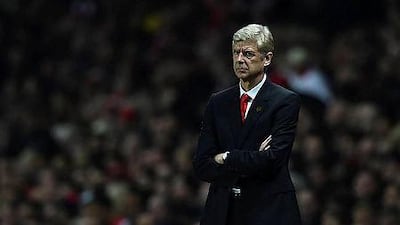He had long since established himself as his club’s most successful manager but, around pensionable age, he was at a time when contemporaries’ careers were ending.
A downturn in results suggested he was in decline himself, just as a disorganised defence accounted for some embarrassing setbacks. There were increasing calls for a legend to go.
For Arsene Wenger in November 2014, read Sir Alex Ferguson in 2005. The great Scot went on to win a further five league titles, reaching three more Uefa Champions League finals and making Manchester United officially Europe’s best team in 2008.
Ferguson was a one-off – as well, given his gift for harbouring grudges, as a man who never forgot or forgave those who thought he was finished – but he is proof the giants of their profession should be granted more leeway when there is a downturn in results.
In Arsenal’s case, that equates to their worst start to a league season for 32 years. One of the great lessons of Wenger’s 18-year reign, however, is that it matters less how Arsenal begin a campaign than where they end it.
One of the great paradoxes is that an era of such rare stability – annual top-four finishes, along with qualification for the knockout stages of the Champions League, all under the same manager – has brought some hysterical overreactions.
There comes a stage in every year when the theory is floated, sometimes aggressively, that Wenger’s time is up, that this will be the year when his consistent record is marred by costly underachievement.
Now his detractors can look at a league table which shows Arsenal eighth in a division where only two teams have really excelled.
Their four wins all came against sides in the bottom seven. Saturday’s 2-1 defeat to Manchester United seemed to sum up their failings: a lack of ruthlessness in attack, a propensity for defensive mishaps, an inability to beat their major rivals, the sense that this is a side with marked mental frailties.
It was the late-period Wenger’s Arsenal in microcosm.
And, indeed, it was a day when his idiosyncrasies became irritating, when transfer-market mistakes that many identified were exposed.
The Frenchman has a unique approach to assembling a squad, overloading Arsenal with attack-minded midfielders and leaving them short of specialists elsewhere.
He was fortunate last season that Olivier Giroud, the sole out-and-out striker he actually trusted, remained fit then, but his lack has run out now.
Neglecting to sign a world-class defensive midfielder was an obvious failing in both 2013 and 2014.
Letting Carl Jenkinson join West Ham United, where the loanee has prospered, appears an ever greater error as Wenger entered this campaign with only four players for three positions at centre-back and right-back.
When Mathieu Debuchy and Laurent Koscielny then incurred injuries, it left Arsenal not just lacking cover, but short-staffed.
Left-back Nacho Monreal’s inadequacies as a makeshift centre-back were apparent as Arsenal squandered three- and one-goal leads against Anderlecht and Swansea City respectively.
When chasing the game against United, they left the substandard stand-in Monreal and the slow Per Mertesacker alone against Robin van Persie and Angel Di Maria as everyone else steamed forward.
Defending two against two is a tactic Ferguson’s United were capable of adopting when Rio Ferdinand and Nemanja Vidic were utterly dominant and magnificently mobile. With Monreal and Mertesacker, it was a kamikaze ploy. Arsenal were duly punished.
It is on such occasions that Wenger looks especially naive. Louis van Gaal entered the match with a game plan, isolating his players against opponents with weaknesses and asking Wayne Rooney to play a disciplined role as Mikel Arteta’s man-marker.
Wenger sent his side out to attack. He has long been accused of prioritising technique over tactics.
Yet his eccentricities and his obstinacy form part of the package and, for all the frustration his stubborn refusal to change generates, his is a board-friendly formula where revenue is generated and Arsenal’s standards never slide to the extent that, say, Liverpool’s have this season or United’s last year.
They have never gone into meltdown; they merely do not win enough trophies.
Arsenal supporters can be forgiven for wondering what happens when Wenger’s long tenure comes to an end – and Jurgen Klopp is the outstanding candidate to succeed him, perhaps followed by Roberto Martinez – but that does not mean they should canvass for his dismissal.
As Arsenal’s owners are really investors and as Wenger, even when spending sizeable sums on Mesut Ozil and Alexis Sanchez, remains a brilliant businessman, the debate about his future can ignore the reality of the situation.
Arsenal will not dismiss Wenger. But, more importantly, nor should they.
sports@thenational.ae
Follow our sports coverage on twitter at @SprtNationalUAE


